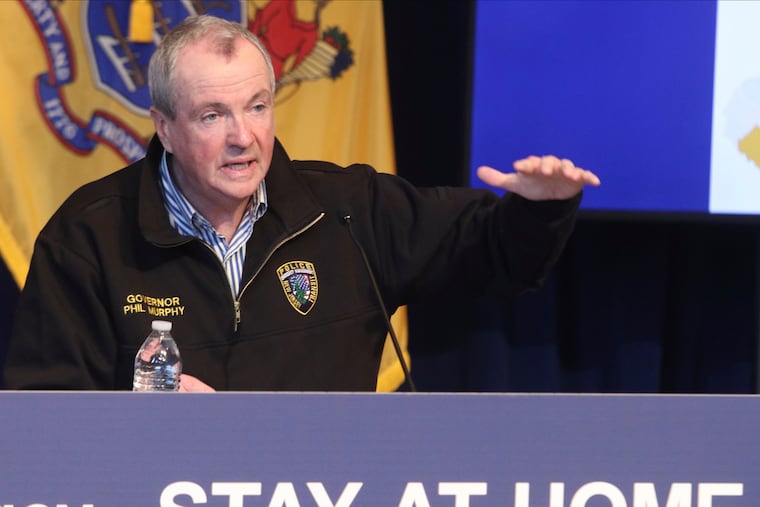New Jersey Gov. Phil Murphy on waking up from surgery a year ago — just as coronavirus hit the state
New Jersey's first coronavirus case arrived a year ago, on the same day of Gov. Phil Murphy's cancer surgery.

New Jersey Gov. Phil Murphy awoke from surgery to a changed world. It was March 4, 2020, and he’d just had a cancerous tumor removed from his left kidney.
Murphy picked up his phone in his hospital room, still disoriented from the operation. The first text he saw was from a staffer: New Jersey had its first confirmed case of COVID-19.
Within weeks, schools and businesses were closed, and most of the state was under a stay-at-home order. Murphy, who planned to spend much of March recovering, instead held a news conference about a week after his surgery. Coronavirus tests were scarce and visitors were still allowed in nursing homes. It would be weeks more before Murphy, acting on guidance from the Centers for Disease Control and Prevention, urged residents to wear masks in stores and months before he asked out-of-state travelers to quarantine.
“We’re still paying the price for a lack of national strategy,” Murphy, 63, said in an interview Wednesday marking the anniversary Thursday of the virus’ arrival in his state. “If we’d known sooner what we ultimately did learn, about the massive amount of spread in the New York City suburbs that was going on in January, February ... lives would have been saved.”
Murphy’s diagnosis in February came as he and his administration were planning the state’s initial response to the virus. Discovered during a routine checkup, the tumor was detected early, and his prognosis was good. Murphy told NJ Advance Media that he planned on recovering in time to run a 5K in April.
Murphy’s cancer diagnosis was “a complete and utter out-of-body experience,” his wife, first lady Tammy Murphy, recalled Wednesday. She was concerned not just with her husband’s health, but with how the procedure could affect his ability to govern at a crucial time.
» READ MORE: Phil Murphy gave New Jersey progressives what he promised. Now they’ve got his back for reelection.
The surgery was held less than a month before the state suspended elective procedures in hospitals. Had the tumor been found later, Murphy said, his elective operation would have been postponed. He stood by the decision to halt those procedures, given the mounting hospitalizations of COVID-19 patients around the state.
“It did inform for me the importance of reopening those surgeries,” he said of his experience.
As he was in surgery that day in March, Tammy Murphy’s phone lit up with messages and calls from other state officials who were tracking the virus. With the news of the state’s first confirmed case, she realized Murphy would have to be back on his feet sooner than planned.
“If he was functionally capable of going back to work, it was the right thing to do,” she said.
The operation was successful, and Murphy has remained cancer-free.
There have been close to 800,000 confirmed COVID-19 cases in the state, and more than 21,000 New Jerseyans have died. Frustration lingers over some business restrictions and crowd limits, but the state has gradually reopened since last spring and has administered more than 2.1 million vaccines. In a late 2020 poll, most voters still approved of Murphy’s pandemic response.
» READ MORE: New Jersey Gov. Phil Murphy’s coronavirus response put him in the spotlight. Can it help lift him to reelection?
Speaking with family of those lost to the virus has become a regular part of Murphy’s week, as well as talking to small-business owners struggling to stay afloat.
“I don’t walk around feeling some extra sense of my mortality,” he said. “But understanding the humanity of this loss. ... It makes you think about life differently.”
When much of her daily routine became virtual, Tammy Murphy said she focused on finding places she could fill gaps in need. In tapping people to help run the nonprofit New Jersey Pandemic Relief Fund, created within days of the state’s shutdown, she relied on assists from many people she’s still never met in person.
The fund has raised more than $64 million, much of which has gone to support direct-service organizations like food banks. The reports of widespread job loss and financial despair among New Jerseyans likely led many to reflect anew on their own privileges, she said, and inspired them to give what they could to help those with less.
“Inequity is not new, but this year added urgency to our mission,” she said. “I think a lot of people have seen others suffering, and that’s probably a silver lining to the pandemic.”